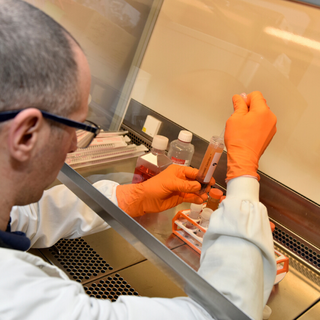How our research helps other types of cancers
Our investment in blood cancer research has provided crucial understanding of how cancers develop, as well as tests and treatments. Some of this learning has helped people with other types of cancer and other diseases.
Establishing the pathology tests of today
Professor David Mason showed that it was possible to use antibodies in the routine diagnosis of blood cancer. His work elicited a whole new approach to testing tissue samples: hundreds of tests for other cancers and many other diseases have been developed as a result of his work.
A prototype for childhood cancer
Our research has shown that childhood leukaemia is caused by a change that occurs in the womb, combined with further genetic alterations that happen in infancy. It has since been suggested that this research can be applied to other childhood cancers, especially in those occurring before age 10. This could pave the way to similar discoveries in other types of cancers that affect young children.
Clonal origins and the evolution of cancer
Genetic analysis of childhood acute lymphoblastic leukaemia (ALL) first revealed that even a simple cancer can undergo complicated genetic changes in response to pressures in the cancer’s environment or in response to treatment.
This leads to parts of cancer having different combinations of mutations, like many different branches of a tree. This discovery explains why cancers are so difficult to treat. Even if you can target a single ‘branch’, multiple branches need to be targeted. This research redefined what was originally thought about the development of cancer and was could also be applied to solid tumours of the kidney, breast, brain, bowel and prostate.
Cancer stem cells as key drivers of cancer
The concept of a cancer stem cell had been proposed since the 1970s. However, it was only seen as important when it was shown to be responsible for generating a steam of cancer cells and causing drug resistance. We made a significant contribution to improve the understanding around the importance of cancer stem cells.
Monoclonal antibodies as drugs
Many of today’s targeted treatments are antibody-based, and blood cancers played a pivotal role in the initial research which lead to the development of these drugs. These drugs are used to treat cancers as well as autoimmune disorders such as multiple sclerosis and arthritis.
Monitoring treatment responses
The blood-borne character of leukaemia facilitated the development of the first minimal residual disease (MRD) test by Blood Cancer UK-funded scientists which detects left over cancer cells in the blood after treatment and can predict relapse.
With more sophisticated genetic analysis tools, researchers working on solid tumours are now adapting this technique. They can look for tumour DNA in the blood using something called a liquid biopsy. This can reveal whether the tumour is responding to treatment, or whether someone is likely to see their disease return.



